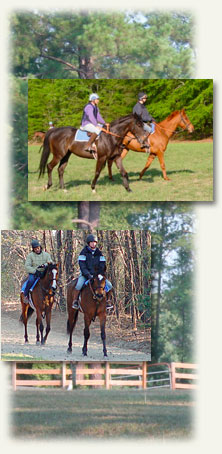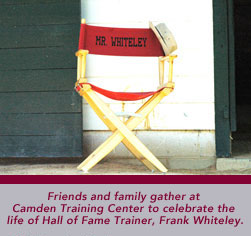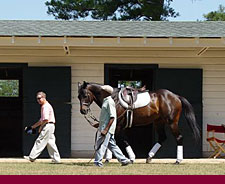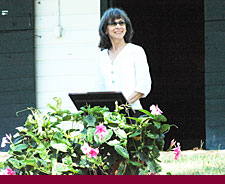 |
||||
 |
||||
|
News Archives On June 7, 2008, the Camden Training Center hosted a celebration of the life of famed trainer, Frank Whiteley, a long-time Camden resident. The following articles are reprinted from the Chronicle Independent: "Family & Friends Gather at Whiteley's Old Barn 9" Family & Friends Gather at Whiteley's Old Barn 9 at the Camden Training Center By Tom Didato, Sports Editor
On a warm Saturday morning in front of Whiteley's old Barn 9 at the Camden Training Center, a riderless horse was taken by the reins by Harry "Cigar" Milligan, one of the late Hall of Fame trainer's former grooms. Before the horse was to make his way behind the Celebration Gospel Ensemble, who were putting an end to the memorial in song, the horse stood on his front two legs and gave two quick kicks with his hind legs. Shadwell Stables' manager and former Whiteley assistant Bob Witham nearly took the brunt of the kicks, which, fortunately, did little but punctuate the hot air. In a way, this may have been Whiteley's final parting shot to the group of family, friends, colleagues and acquaintances who turned out for a last good-bye to the colorful Thoroughbred conditioner. Throughout the service, Whiteley stories were told. Some old, some new. All, however, were from the heart. His granddaughter and grandson talked of how their late grandfather would call each day to check up on them to see how they were doing. His granddaughter, Kyle, became emotional when she recounted how on each birthday, she was sure to receive a card with a "fuzzy bear" on it with the words,"I love you. Papa" on the bottom. There was Whiteley's grandson, Seth Whiteley, a farrier, who recounted how his grandfather would always call to check up on how his was doing in his chosen profession and offer words of advice. On the lighter side, former Whiteley exercise rider and television sports commentator Charlsie Cantey talked of how Whiteley helped the women's movement in Thoroughbred racing by putting female exercise riders on the backs of his runners. She also told the story of how Whiteley had to put a "Port-A-Potty" behind the barn so that the women would have their own rest room. Cantey brought smiles to the faces of many in the crowd with her depiction of her former boss, who could be as gruff and ornery as any trainer in history, but inside was a man with a heart as big as a shedrow.
Nearly 20 years ago, I decided to approach Mr. Whiteley to see if he would be agreeable to an interview. It was 1989, when Private Terms which Whiteley trained in Camden and sent to trainer Shug McGaughey, was on the Triple Crown trail. I had heard some of the stories about Mr. Whiteley and his general disdain for the press and how this interview might last all of a few seconds if he did not take to me. So, I sought the advice of retired trainer Joe Cantey. Meeting with Joe one night, eh ran down the "do's and don'ts" of how to approach Mr. Whiteley. He told me that Mr. Whiteley would test me from the start and probably say a few unflattering things about the press. He may also say this was a waste of time in his rather colorful language. If Mr. Whiteley liked you, though, Joe said he could be rather gregarious. His advice to me, without going into descriptive detail, was to try and match his tone by not backing down. Joe proved to be right on the mark. I tried to do what he said. Finally, all those days in New York would pay off. As soon as I arrived at Mr. Whiteley's Palmetto Stud, I came upon him sitting atop a tractor, cigarette dangling from the side of his mouth with a baseball cap atop his white-colored hair. "Who are you and who are you looking for?," Mr. Whiteley barked. I answered by telling him who I was, who I worked for and who I was looking for. Almost as if it went by Cantey's script, Mr. Whiteley asked, "What do you want to talk to that old son of a (gun) for. He's old and doesn't train at the track anymore." First thinking about what I should say and then remembering what Joe told me to do, I spiced up my language a bit and said that I had called Mr. Whiteley, who agreed to meet me for an interview and that I hoped that I hadn't come out here on a hot afternoon for nothing. With a big smile, he stuck out his right hand and introduced himself to me and I to him. It took him about all of 45 seconds to make a joke about my Italian ancestry. After that, he went on to talk about his disdain for members of the press. "You know," he said, "I never got along good with the press? They asked too many dumb questions." After that, Mr. Whiteley proceeded to talk about writers and sportscasters, including mentioning several by name, who did not know what they were doing when it came to covering racing. He was rather descriptive in talking about one former pro football player turned sports reporter whom he said asked McGaughey some stupid questions about Private Terms. Whether or not those stories were a cue for me not to overstep my bounds in my questions to him, I kept my questions simple and let Mr. Whiteley do the talking and take me where he wanted to go. It was a decision which I would not regret. Mr. Whiteley regaled me with stories from his career in his inimitable style and language. He talked about his mischievous side, in fooling the "know it all" members of the press by posing the wrong horse for their pictures or magazines. On more than one occasion, photos of horses not nearly as accomplished as Damascus or Ruffian appeared in national publications when Mr. Whiteley told the photographers that the horse they were looking for wasin a nearby paddock, while the hose they intended to photograph was in their respective stall. On some subjects, he raised his voice to show his disdain. With others, he was as mellow as a house cat sunning himself on the ledge of a window on a cold day. Late in our conversation, when the subject matter turned to Ruffian and her ill-fated final race with Foolish Pleasure, Mr. Whiteley's gruff exterior melted away. Gone was the "tough as nails" persona. In its place was the gentleman with a huge heart, whom Charlsie Cantey referred to on Saturday. In telling the story of Ruffian, as told by the person who knew her best, showed a completely different side of the man who greeted me upon my arrival on his property less than two hours earlier. There was a compassion in his voice which I never would have guessed there would have been just minutes earlier. This was a side of the man which not even Joe's words of direction would have led me to believe that I would have seen. As days and years passed and I learned even more of Mr. Whiteley from those who worked with him or knew him from his days at the race track, I came to understand just how passionate this man was about his chosen profession and the horses and people at his barn. In later years, I would see Mr. Whiteley as various places and events and stopped by to talk with him about racing. He was still sharp as a doctor's needle when it came to horse racing and who was doing what in the sport. A little more than a year ago, when I called to talk to him about the made-for-TV movie "Ruffian" based on the book and recollections of writer Bill Nack, Mr. Whiteley sounded like anything but a retired man of 92. I introduced myself again and told him my job title. "I know who you are. I remember you," he said as if wondering why I needed to take up that bit of time before we got into the purpose of my call. You could sense the anger in his voice and his blood boiling when I asked for his take on the movie. He said he would not watch it when it hit the airwaves. "It never should have been made," he said, quite angrily, when asked for his personal opinion on the project. Even after getting him steamed on that subject, Mr. Whiteley was gracious, as always, before hanging up. I told him that I was sorry for bothering him and how I hoped everything was going well with him and I thanked him for taking time to talk with me, once again. "That's all right," he said in a more mellow tone. "You take care, partner." On Saturday, people came out to give one more "Take care, partner" to the late Frank Y. Whiteley Jr., who probably would have thought too big of a fuss was made out of his passing at 93. Mr. Whiteley, those who knew him best said, would probably have reprimanded all of us for standing around doing nothing when there was work to be done somewhere else. On this day, however, taking a few minutes of time, standing in front of a barn to say, "Thanks for a job well done" to a mentor and/or a friend was the only place to be. In fact, it was the perfect place.
Writer Jane Schwartz remembers Whiteley By Tom Didato, Sports Editor
For some reason which even Schwartz did not understand, the woman who, to that time, did not have any connection to Thoroughbred racing, was intrigued by the ill-fated ending to the life of Ruffian, the greatest filly in the history of the sport. In what would be Ruffian's 11th and final race, she was leading that year's Kentucky Derby winner by a half-length when she shattered the sesamoid bones in her right front leg. Despite surgery, which was performed on the injury, the 3-year-old was euthanized that evening and laid to rest in the Belmont infield. The media recounts of that race, that day did something to Schwartz. It moved her to saving the article. It took her a decade to go back and find that one story and turn it into a best best-selling book, "Ruffian: Burning From the Start," which was published in 1991. Last Saturday, Schwartz, who spent countless hours in Camden interviewing Ruffian's trainer, Frank Whiteley Jr., returned here to pass on her memories of the late Hall of Fame conditioner. The occasion was the celebration of the life of the 93-year-old Camden resident who passed away May 2. "I wasn't involved in racing, at the time, in any way, but I had just finished my first novel," she said of the origins of the book. "And, 10 years earlier, I had cut out an article in the paper the day after the match race had been run. I didn't even know about the match race. I cut out the article about Ruffian, her death and her career and it was the only time that I had ever cut something out and put in a folder. I put it away and kept it because someday, I just knew that I was going to write, not about Ruffian, but that I was going to be a writer." Soon after her first novel, Caught, had come out, Schwartz began to wonder just where her second book would come from. Turns out, it was right under her nose all along. The newspaper article may had yellowed, but Schwartz knew where it was and what she needed to do, albeit at a strange hour of the morning. "I said to myself, What am I going to do next?" she said of searching for a story idea for her second book. "I, literally, hadn't looked at that folder in 10 years. Then, one night, I woke up in the middle of the night, at 3 o'clock, and said, I'm going to write a book about Ruffian." Determined to follow through on her idea, the then-Boston resident spent months gathering all the information which she could on Ruffian and her career. After scouring magazine and newspaper stories, it came time for Schwartz to try and get in touch with those associated with Ruffian. At the top of that list was Frank Whiteley, the champion horses trainer who was retired from the track and living in Camden. Before contacting Whiteley, Schwartz spent time interviewing Ruffians jockey, Jacinto Vasquez, who was riding horses at Gulfstream Park in Florida. It was Vasquez who gave Schwartz Whiteleys address and phone number. Before leaving Florida, she told Vasquez that she would send a letter to Whiteley, requesting a meeting. "Jacinto said, Call him up. Don't bother with the letter. Just call him up," she said. Schwartz took Vasquezs advice and called Whiteley and set up a date and time in which she would travel from her New York home to Camden for the interview. Borrowing money for plane fare and a hotel room, Schwartz arrived in Camden and made contact with Whiteley, who all but burst her balloon when trying to set up their agreed-upon meeting. "I called Frank and he said, I'm too damn busy to meet with you. I’m leaving in the morning, anyway," she recalled. Persistent in her quest, Schwartz asked Whiteley if she could just meet with him for a few minutes to see the man. She told Whiteley that even a few short minutes would help in the writing of the book. "He said to me, I ain't got nothing to tell you. I don't remember anything and Ive told everybody everything (about Ruffian)," she said. Schwartz kept on pleading for just a few minutes and said just meeting Whiteley and shaking his hand would add a different perspective to the book. Finally, in words which cannot be printed here, Whiteley relented and gave in. The pair met at 5 p.m. that afternoon. Four hours later, after having gone into town for dinner, they were still talking when Whiteley looked at his watch and told Schwartz that she had kept him up later than he would have liked with an early morning trip to deliver horses to Delaware Park on tap for the following day. Obviously, there was something about Schwartz which Whiteley liked and trusted as he met with her again the following morning before joining with his shipment of horses. From then, Schwartz returned to Camden on many an occasion and did so for years. She watched the way in which Whiteley directed his barn, how he acted and even his mannerisms which helped in telling the complete story of Ruffian and her trainer. "I learned things that he, at first, would gloss over or deny or something," she said of Whiteley and Ruffian. "Then, a year later, I'd get a little tidbit of support from somebody who let something slip like a Jacinto or somebody and I'd go back to Frank and say, "Frank, are you sure that Ruffian never had a sick day in her life? He'd think back and say, Well, maybe she had a fever on this day or whatever. But he remembered everything." Never a darling of the media and vice-versa, Whiteley could be cantankerous with members of the fourth estate. Having done her homework before meeting with Whiteley, Schwartz said part of the reason why Whiteley opened himself up to her on this project was due to a non-adversarial relationship in which it was not so much as a writer peppering their subject with question after question as it was just two people carrying on a conversation. Whiteley was at ease with Schwartz, making for a smooth working relationship not only with the trainer, but those associated with Ruffian such as her exercise riders and other workers in the barn. "As people got to trust me," Schwartz said, "they all reinforced each other, a little bit, too. So, they all opened up more. I knew that these were people who wouldn't say everything the first time. You can't go in, sit down with people for an hour, then write a book thats worth anything." Schwartz’s book is the definitive story of Ruffians career and how the freak of a filly affected the lives of the humans who looked after her as well as the fans she made by her breaking nine records in her 10 wins. Performing the necessary research and then writing the book nearly took over Schwartz life for five years. The book, though, was far from the only thing on her plate. "It was a process," she said while talking beneath the pine trees at the Camden Training Center. "I was teaching at Hunter College at the time. I had other responsibilities. But from the time that I started researching in archives, magazines, looking at tapes and everything I could find and reading the history of 100 years of racing and how this all fit in, until I gave completed draft to my publisher, it was five years." Selling the book to a publisher was fairly, considering that in the world of horse racing, Schwartz was a novice. But her first novel, which dealt with the world of racing pigeon flyers in Brooklyn, was also a chance for her to explore a subject which she immersed herself in. Her editor knew what he was getting from Schwartz and let her run with her latest project. Having already dealt with Whiteley, working with her editor on the book about Ruffian was not such a daunting task. The editor knew nothing about horses, horse racing or even who Ruffian was. But he was a taskmaster whose only demand was that the book be done right. "He was a book editor like Frank Whiteley was a trainer and he wanted to make me better at whatever I wanted to do and not do what he wanted somebody to do," Schwartz said. "I gave him 50 pages of the book and an outline about what I would do with some of the key points and we talked about it. He was 100 percent behind it and he was great and this was not at a time when people were publishing racing books." While comparing her editor to Whiteley, Schwartz was quick to point out that Whiteley and those who worked with and for him were memorable characters who brought her book to life. This was o small feat considering how Whiteley did not want to have anything to do with Schwartz at the beginning of her journey to Camden. "I can remember all of it like it was yesterday with Frank ... I really can," she said. "The way they remembered everything about the horses, because it was so significant to them was like what I do. This was such a significant subject. I loved the people and the story. I wanted, very much, to do justice to all of them. I really cared about them." Schwartz admitted that she was glad that she found the gumption to ask Whiteley for a few minutes of his time after having first been rebuffed in her initial request. She also spoke in reverent terms in recalling that first meeting with him. "(I remember) the first day, just because it looked like it was going to go so badly," she said of the most memorable of her talks and meetings with Whiteley in Camden. "But by the end of that night, I knew that we had cemented something that would go on to become the foundation of the book. "I will never forget when he looked out and said, Race horses are animals of freedom. I don't think you'll find too many trainers today who will say that as the first thing that they say to somebody publicly." As she talked of working with Frank Whiteley Jr. on the book, Schwartz said she see all of the trainer's emotions. She was there for the good days and the bad, the days he would open up and the days he would keep to himself. One thing the entire experience did for her was to make her an unabashed fan of horse racing. For 10 years, through the mid to late 1990s, Schwartz wrote a column called "Free Rein," which appeared in the Daily Racing Form. She still writes about racing, in addition to other subjects, "although its certainly rich enough to be an only subject. I still love the sport and follow it," she said. There has never been another Ruffian. There may never be another Ruffian who will step on the track again and be conditioned by a colorful a trainer as Frank Whiteley Jr. But horse racing has and will continue to have stories unfold. Maybe one day, Jan Schwartz will take a story from a paper, clip it out and put it into a folder for another novel for another day. She knows one thing, it probably won't entice her in the same way as Ruffian and her connections did. "I don't look for it and I would be open to it, but nothing will ever captivate me like this story did," she said when asked if she would consider writing another racing novel. "But if something comes close, maybe I will, sometime."
|
||||
|
|
||||
|
CTC | FACILITIES | RESULTS | NEWS | LOCATION | CLIENTS | CONTACT
Camden, South Carolina | 803-513-2939 |
||||
 Maybe, just maybe, Frank Whiteley Jr. can still get a horse to do what he wants, when he wants. After all, as the Rev. Richard Cameron said, to lead off the celebration of the late Thoroughbred trainer's life, that "Frank Whiteley is now working for God's stable."
Maybe, just maybe, Frank Whiteley Jr. can still get a horse to do what he wants, when he wants. After all, as the Rev. Richard Cameron said, to lead off the celebration of the late Thoroughbred trainer's life, that "Frank Whiteley is now working for God's stable." Of all those assembled on Saturday, I'm guessing that my connection to Frank Whiteley Jr. ranked in the bottom one-half percent of the gathering. That does not mean that I did not have several lasting memories of the training legend.
Of all those assembled on Saturday, I'm guessing that my connection to Frank Whiteley Jr. ranked in the bottom one-half percent of the gathering. That does not mean that I did not have several lasting memories of the training legend. Tucked away in one of her folders for more than 10 years, something led Jane Schwartz back to a newspaper story which she, for some reason, had cut out detailing the July 6, 1975 match race between Ruffian and Foolish Pleasure at New York's Belmont Park.
Tucked away in one of her folders for more than 10 years, something led Jane Schwartz back to a newspaper story which she, for some reason, had cut out detailing the July 6, 1975 match race between Ruffian and Foolish Pleasure at New York's Belmont Park.